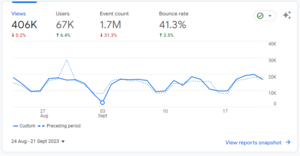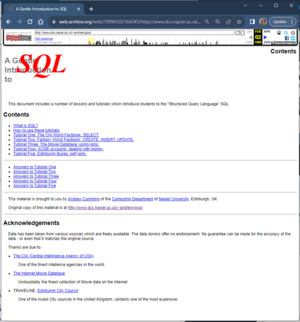SQLZoo:About
SQLZoo includes tutorials and reference to support people learning SQL.
Zookeeper
The site is maintained by Andrew Cumming a software developer at Intelligent Growth Solutions based in Edinburgh, UK. You can contact him at sqlzoo.qa@gmail.com but he's always busy with the day jobs.
Terms and Conditions
None. Everyone in the world is welcome to use this site and the material on it in any way they see fit.
Academic Users
Many users are from education institutions (the material was initially developed for use at Edinburgh Napier University). I am very happy to support these users, the site works particularly well with large classes where one instructor can support a large class of learners face to face. If you are running a class and something is not working right you are my top priorty - get in touch right away.
Advertising
August 2023 - We have deals with DataWars and Channel - there is a simple banners that shows one at random then strictly alternates on reload or page navigation. I hope to have three such sponsors eventually. Enquiries to fill that third slot are welcome.
We've removed google ads and cleanmedia. We're still using the google tracker analytics but plan to ditch that too - we could be totally cookie free.
We run google ads and we are showing video ads to USA users via cleanmedia.com; as I am based outside the USA I don't see these ads and so I don't have a good idea if they are intrusive - Id be happy to get feedback from users about that.
Making money is not the point of the site and so https://noads.sqlzoo.net is available for anyone to use.
Changes
- 2023-09-22 Comparing SA I have more hits but fewer visitor. September normally sees an increase in hits. Possibly institutional users (often many students sharing one IP) are not being counted separately by SA who do not use cookies).

Google Analytics 
Simple Analytics - 2023-09-16 Belatedly imported google analytics into simple so a week was double counted. Live and learn.
- 2023-09-13 Switched on simpleanalytics, the plan is to run both google analyics and simpleanalytics for a month or so then switch off google
- ...
- 1999-02-02 Introduced CSS:

Kind words
Particularly flattering reviews
SQLZoo: The best way to learn SQL
SQL Practice:SQLZoo is the best way to learn SQL
SQLZoo: Here was my experience of learning SQL on SQLZoo | SqlBot
Why is it called SQLzoo
The inmates of SQLzoo are the SQL engines (MySQL, Oracle, SQL Server and others). They have been tamed, caged and defanged so that members of the public can pet them or poke them or gawk at them. In the wild, these engines are dangerous, needy beasts but in the confines of SQLzoo they are relatively safe. Once you have an idea of what SQL is and how it works you should install an SQL engine on your own computer and play with the real thing.
Wiki Nature
It is based on MediaWiki and it allows users to change the content. http://www.mediawiki.org/wiki/Help:Editing_pages shows how to edit pages in "standard" media wiki.
- Only users with the teacher role can edit pages.
- Any teachers who can help with fixing errors or creating content are most welcome
- Send an email (ideally from an educational address) to sqlzoo.qa@gmail.com and tell us your user name - we can add that role so that you can edit.
SQLZoo features:
- Interactive access to several SQL engines
- Sample databases
- Practical exercise
- Instant feedback on the success of the student's attempts
Data
The data used in the databases is available in a slightly odd version of SQL:
For example
- http://sqlzoo.net/w/index.php?title=Createworld.txt&action=raw a script to create the world database
- http://sqlzoo.net/w/index.php?title=Tabworld.txt&action=raw the data to go in that table
- MySQL format Buses Covid EURO2012 General Election Movies Nobel Teachers World
Format
SQLZoo includes a number of extensions to normal Wiki text:
- class='qu'
- A div with class
quis interpreted as an interactive question. - A
div.quelement should include asource.defelement- This contains the default text that the user sees.
- Sometime this is a useful hint and is close to the correct answer.
- It may be empty - but users often click without changing the text before even looking at it
- A
div.quelement may include asource.anselement- This contains the correct SQL.
- This is hidden from the user (but not well hidden)
- The user's result is compared with the answers result and a score is calculated
- A div with class
Here is an example of a question:
==Warming up== <div class='qu'> [[Read the notes about this table.]] Observe the result of running a simple SQL command. <source lang='sql' class='def'> SELECT name, continent, population FROM world </source> <source lang='sql' class='ans'> SELECT name, continent, population FROM world </source> </div>
And here is how that looks when rendered...
Warming up
Read the notes about this table. Observe the result of running a simple SQL command.
SELECT name, continent, population FROM world
SELECT name, continent, population FROM world
StartAt
You can include a ***startAt*** span at the top of the page. This will ensure that question numbering starts at the specified value.
<span id=startAt class=params>6</span>
respectorder
Most questions do not respect order - a query is considered correct even if the order of the student's work differs from the correct answer. You can over-ride that rule by insisting that the question respects order. Place this invisible tag in your qu tag.
<span class='params respectorder'></span>
Order must be right
Show countries beginning with D by population size.
SELECT name
FROM world
WHERE name LIKE 'D%'
ORDER by name
SELECT name
FROM world
WHERE name LIKE 'D%'
ORDER by population
Hints
You can include a hint. The title will be shown, if the user clicks on the text the body will be revealed:
<div class='hint' title='Click here to see the hint'>Now the hint has been revealed</div>
Clear Results
<div class="lsclear">Clear your results</div>
MySQL server configuration
/etc/mysql/conf.d/sqlzoo.cnf
#MySQL configuration- suitable for students learning SQL # put this in /etc/mysql/conf.d/sqlzoo.cnf [mysqld] # A common error is a missing or incorrect JOIN condition - set a low value to help # errors are discovered faster # the cost of poorly constructed queries is reduced max_join_size = 1000000 # Get compile time errors rather than return incorrect result sets sql_mode = 'ONLY_FULL_GROUP_BY,NO_ZERO_DATE,NO_ZERO_DATE,ERROR_FOR_DIVISION_BY_ZERO,ANSI'